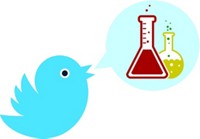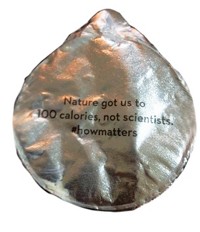Advertisement
Grab your lab coat. Let's get started
Welcome!
Welcome!
Create an account below to get 6 C&EN articles per month, receive newsletters and more - all free.
It seems this is your first time logging in online. Please enter the following information to continue.
As an ACS member you automatically get access to this site. All we need is few more details to create your reading experience.
Not you? Sign in with a different account.
Not you? Sign in with a different account.
ERROR 1
ERROR 1
ERROR 2
ERROR 2
ERROR 2
ERROR 2
ERROR 2
Password and Confirm password must match.
If you have an ACS member number, please enter it here so we can link this account to your membership. (optional)
ERROR 2
ACS values your privacy. By submitting your information, you are gaining access to C&EN and subscribing to our weekly newsletter. We use the information you provide to make your reading experience better, and we will never sell your data to third party members.
Science Communication
Chobani’s Accidental Culture War
How a yogurt lid marketing slogan pushed scientists’ emotional buttons
by Carmen Drahl
June 10, 2014

Piper Klemm did not set out to start a movement from the breakfast table. But when the chemist and startup company founder peeled back the foil lid on a container of Chobani Greek yogurt recently, she got angry.
The lid reads, “Nature got us to 100 calories, not scientists,” and promotes a Chobani social media campaign by adding the hashtag #howmatters. Klemm vented her rage on Twitter:
Fixed that for you. #howmatters pic.twitter.com/yKMQzPLUrV
— Tree Lobsters! (@treelobsters) June 4, 2014Dear @Chobani,
As a natural products chemist, I can honestly say "I love eating chemicals." #howmatters
Cheers,
@kzrt
— kurt allerslev (@kzrt) June 4, 2014"Nature got us to 100 calories, not scientists" -chobani grrrrr
— Dr. Piper Klemm (@piperjklemm) June 3, 2014Then, Klemm went about her day. When she next checked in, she was in the eye of an social media firestorm.
Scientists from all disciplines have rallied to Klemm’s cause. Chemists, entomologists, and programmers alike were sharing her photo of the yogurt lid and angrily denouncing Chobani. Some scientists indulged a little “hashtag activism” and turned the company’s #howmatters hashtag into something it did not expect. They reminded the firm just how much science goes into mass-producing and distributing its 100 calorie yogurt cups.
In response to the proscience outcry, Chobani’s Twitter feed turned into a stream of apologies. Some of the company’s tweets, for example one that claimed that the yogurt was “chemical-free,” only further raised researchers’ ire.
.@Chobani I think you mean "no added synthetic chemicals". It's natural chemicals that got you to 100 calories. @parmB
— Luke Gamon (@lgamon) June 4, 2014@ParmB No chemicals in Chobani. Our products are made w/ only natural ingredients.
— Chobani (@Chobani) June 4, 2014Actually, chemicals got you to 100 calories @Chobani http://t.co/ZFaHV9rKYz
— Parm (@ParmB) June 4, 2014We were too clever for our own good - didn’t intend to put down science or scientists with our recent lid. We discontinued it. #WordsMatter
— Chobani (@Chobani) June 4, 2014In a statement provided to C&EN, Chobani said it has discontinued the lid. Its message “was not intended as an indictment of science or scientists but a celebration of nature,” the statement reads. And Peter McGuinness, Chief of Marketing and Brand Officer at Chobani, offered an apology to pharmacologist and Forbes blogger David Kroll: “We’re a human company. We’re not perfect.”
“Can someone make yogurt at home? Absolutely,” says Kimberlee (K.J.) Burrington, an expert on cultured products, including yogurt, at the University of Wisconsin, Madison’s Center for Dairy Research. “But to make good yogurt consistently, it’s important to know the science behind the process.”
Companies referring to products as natural are nothing new. But Klemm thinks she knows why this particular marketing faux-pas went viral. “Most of the things that say ‘chemical-free’ don’t attack scientists directly. I read this lid and it felt like an attack on me personally.”

“I felt like I was being judged by my freaking yogurt,” agrees Gwen Pearson, the network manager for the Organization of Biological Field Stations. Pearson regularly purchases Chobani. So when she heard the news she went straight to her refrigerator and began opening containers. She found one of the infamous lids on her third try.
“It’s clear that the marketing team just didn’t think through all the angles for this campaign,” says Brigham Young University graduate student Chad Jones, who covered the fiasco on his podcast, “The Collapsed Wavefunction.”
Up to a point, the campaign was understandable, he says. It promoted the “natural” aspect of Chobani’s yogurt, something many consumers find appealing. “Hopefully Chobani’s learned some lessons that will spread through the industry,” Jones adds, “but that’s probably too optimistic.”
Klemm and Pearson both think that the situation was a success for science communication.Everyday people, Klemm says, want to talk about everyday aspects of science that she was never taught how to articulate. Concerns about food are at or near the top of the list. Chobani’s flub, she says, was an excuse for scientists to enter that conversation.
The incident “has had clear PR consequences for the company,” adds Pearson, who also blogs for WIRED magazine. “The mainstream news picked this story up, and they’ve got people talking about things like what ‘chemical’ means.”
Chobani will send a free yogurt to any scientist who contacts the company at www.chobani.com/care. But Pearson, now an ex-Chobani customer, offered this pointed response: “It’s going to take more than 99 cents’ worth of free yogurt to win me back.”





Join the conversation
Contact the reporter
Submit a Letter to the Editor for publication
Engage with us on Twitter